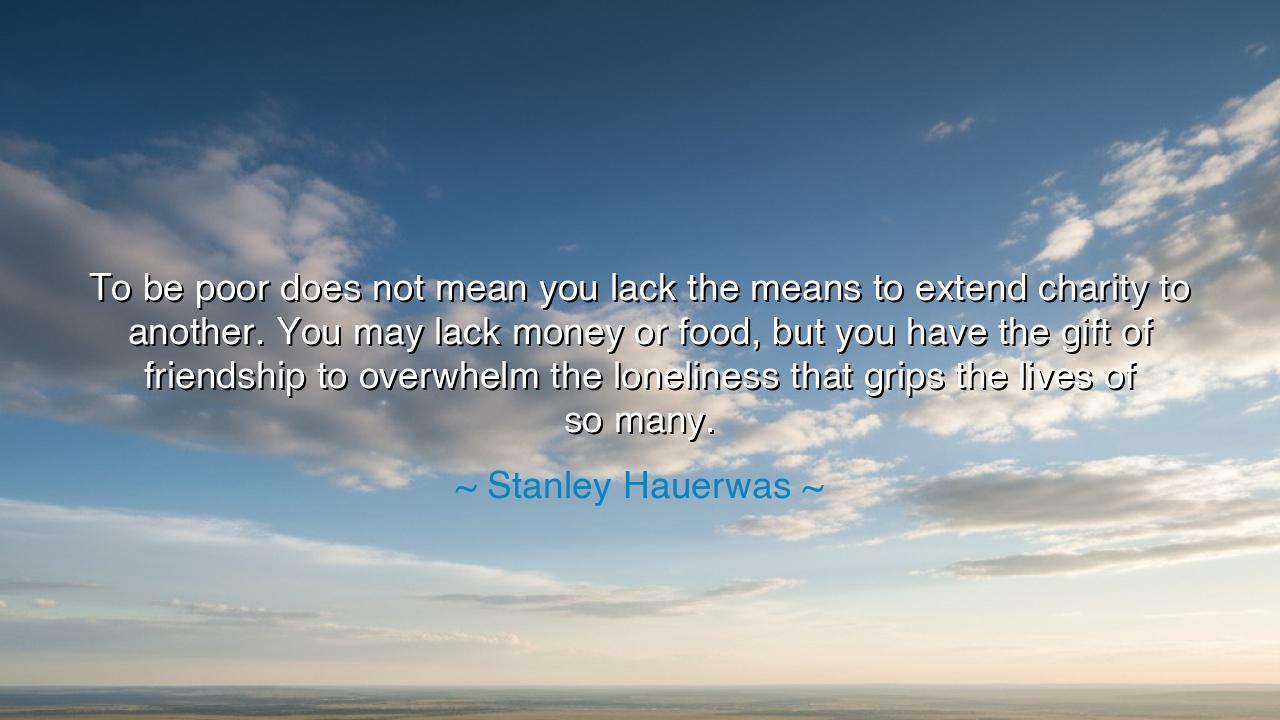
To be poor does not mean you lack the means to extend charity to
To be poor does not mean you lack the means to extend charity to another. You may lack money or food, but you have the gift of friendship to overwhelm the loneliness that grips the lives of so many.






“To be poor does not mean you lack the means to extend charity to another. You may lack money or food, but you have the gift of friendship to overwhelm the loneliness that grips the lives of so many.” — in this profound reflection, Stanley Hauerwas, the theologian and moral philosopher, reveals a truth that transcends wealth, religion, and time itself. His words tear down the false walls between the rich and the poor, reminding us that charity is not measured in gold, but in the warmth of the human spirit. To be poor, he teaches, is not to be powerless — for even the humblest soul possesses the ability to give what is most precious: kindness, friendship, and compassion.
In the ancient world, philosophers spoke often of virtue as the true wealth of man. The Stoics believed that the poor man who lives with virtue is richer than the tyrant who rules without love. Hauerwas’s teaching carries this same noble lineage — it reminds us that charity is not confined to the exchange of material goods, but to the exchange of hearts. A loaf of bread may feed the body for a day, but the gift of friendship nourishes the soul for a lifetime. To comfort the lonely, to lift the weary, to sit beside the forgotten — these are acts of charity far greater than coin.
Consider the story of St. Francis of Assisi, born to wealth but reborn into poverty. When he cast aside his fine garments, he did not become empty; he became full — full of compassion, full of joy, full of the love of humanity. With no silver to offer, he gave his presence, his laughter, his prayers. And through these small gifts, he transformed villages, healed hearts, and rekindled faith in thousands who had despaired. He proved that the power of charity lies not in abundance, but in authenticity — that the truest gift a person can offer is himself.
Hauerwas’s words also remind us that the world’s greatest hunger is not for food, but for connection. In an age of isolation — where cities overflow with people and yet souls starve for understanding — the gift of friendship has become a sacred medicine. The lonely, he says, are not healed by pity, but by presence. When one who has nothing still offers love, the act becomes almost divine. For such generosity asks no reward, no recognition; it springs from the eternal truth that every heart has something to give, no matter how poor the hand that offers it.
The ancients told of Diogenes, the philosopher who owned nothing, living in a barrel beneath the Athenian sun. Yet kings came to seek his counsel, for his mind and spirit were richer than any treasure house. When Alexander the Great asked if he could grant him a favor, Diogenes replied only, “Stand out of my sunlight.” Though he possessed nothing, he lacked nothing — for his freedom, his wisdom, and his contentment were gifts beyond price. Likewise, the poor who give friendship, who share laughter, who offer compassion even in struggle, hold a power greater than kings: the power to heal loneliness.
To those who hear this teaching, let it kindle humility and hope. If you have wealth, use it wisely; if you have none, give from your heart. Visit the forgotten, speak gently to the weary, smile at those the world ignores. Do not say, “I have nothing to give,” for even a kind word may turn the course of a life. The poor in possessions may yet be rich in spirit, and the smallest gesture of care may lift a burden heavier than gold.
Let us then remember this truth: poverty of the hand need not mean poverty of the soul. The greatest acts of charity have often been born from the poorest of circumstances — a mother sharing her last meal, a stranger offering comfort, a friend choosing to listen. The wealth of humanity lies not in what we hold, but in what we share.
Thus, in the words of Stanley Hauerwas, let all generations learn: the measure of your charity is not in your abundance, but in your willingness to love. Be the friend who dispels another’s loneliness; be the light that enters a darkened heart. For though coins may lose their shine and bread may turn stale, the gift of friendship endures forever — the eternal currency of the human soul.






AAdministratorAdministrator
Welcome, honored guests. Please leave a comment, we will respond soon